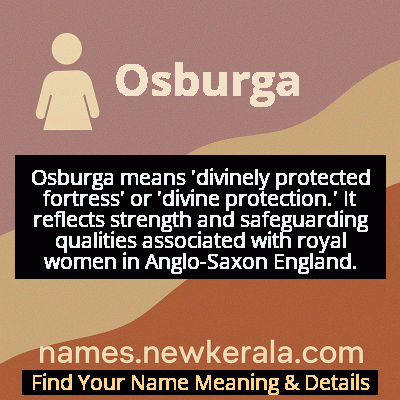Osburga Name Meaning & Details
Origin, Popularity, Numerology Analysis & Name Meaning of Osburga
Discover the origin, meaning, and cultural significance of the name OSBURGA. Delve into its historical roots and explore the lasting impact it has had on communities and traditions.
Name
Osburga
Gender
Female
Origin
Anglo
Lucky Number
2
Meaning of the Name - Osburga
Osburga means 'divinely protected fortress' or 'divine protection.' It reflects strength and safeguarding qualities associated with royal women in Anglo-Saxon England.
Osburga - Complete Numerology Analysis
Your Numerology Number
Based on Pythagorean Numerology System
Ruling Planet
Moon
Positive Nature
Diplomatic, friendly, artistic, empathetic.
Negative Traits
Over-sensitive, moody, indecisive, prone to self-pity.
Lucky Colours
Green, cream, white.
Lucky Days
Monday.
Lucky Stones
Pearl, moonstone.
Harmony Numbers
1, 3, 4.
Best Suited Professions
Diplomats, mediators, caregivers, artists.
What People Like About You
Cooperative spirit, friendliness, artistic talent.
Famous People Named Osburga
Osburga of Wessex
Queen Consort
Mother of Alfred the Great and wife of King Æthelwulf of Wessex
Osburga of Coventry
Religious Figure
Abbess and saint in early English Christianity
Osburga of Mercia
Noblewoman
Wife of King Æthelbald of Mercia and patron of religious houses
Name Variations & International Equivalents
Click on blue names to explore their detailed meanings. Gray names with will be available soon.
Cultural & Historical Significance
The cultural importance of Osburga extends beyond mere royalty to embody the transition from pagan Anglo-Saxon traditions to Christian English identity. Queens and noblewomen named Osburga were often instrumental in founding monasteries, promoting literacy, and maintaining royal lineages during turbulent times of Viking invasions. The name symbolizes the strength and influence of women in early medieval English society, where royal mothers and wives held substantial power in court politics and religious affairs, helping to shape the course of English history.
Extended Personality Analysis
Women named Osburga are typically perceived as possessing a strong, protective nature combined with strategic intelligence and deep loyalty. They embody the qualities of a natural leader—resilient in adversity, principled in their convictions, and fiercely protective of those in their care. This personality profile reflects the historical queens who bore this name, women who needed both strength and wisdom to navigate the complex political landscapes of medieval courts while maintaining family dynasties.
Their character often includes a blend of practical wisdom and spiritual depth, making them both grounded decision-makers and visionary leaders. Osburgas tend to be patient yet determined, capable of long-term planning while remaining adaptable to changing circumstances. They value tradition and heritage but are not afraid to innovate when necessary. This balance of strength and compassion, combined with a natural authority, makes them respected figures in any community or organization they belong to.
Modern Usage & Popularity
In contemporary times, Osburga is an extremely rare name, primarily used by families with strong interests in Anglo-Saxon history or by those seeking unique, historically significant names. It appears occasionally in historical reenactment communities, among scholars of medieval studies, and in families tracing descent from Anglo-Saxon lineages. The name has not appeared in official baby name statistics for over a century, making it a truly distinctive choice that reflects either deep historical awareness or a desire for complete uniqueness in naming.
Symbolic & Spiritual Meanings
Symbolically, Osburga represents divine protection and fortified strength—a name that conjures images of ancient strongholds guarded by higher powers. It embodies the concept of sanctuary and resilience, suggesting both physical security and spiritual safeguarding. The name carries connotations of ancestral wisdom and historical continuity, serving as a bridge between ancient traditions and contemporary identity. Metaphorically, it suggests a person who provides protection and stability to others while maintaining strong personal boundaries and principles.

